Cleaning supplies made from from all-natural green cleaning ingredients such as vinegar, baking soda, Castile soap and hydrogen peroxide are amazing! In the correct combinations these green cleaning ingredients can leave your whole house sparkling (for only a few cents) while eliminating the need for toxic household chemicals.
Unfortunately…
Many natural DIY cleaner recipes found online combine ingredients that should NEVER be combined.
Some of the combinations simply neutralize one another, killing their cleaning power and wasting your money… while other combinations can produce dangerous reaction that can damage your lungs or home surfaces.
Ineffective Green Cleaning Ingredients
There are three green cleaning ingredient combinations that should NEVER be used in one DIY cleaning recipe. Learn about these ineffective combinations:
1. Hydrogen Peroxide + Vinegar = Peracetic Acid
Hydrogen peroxide and vinegar are both great natural cleaners and sanitizers, BUT combining them in a container creates a corrosive acid.
The risk: Bodily damage and/or damage to household surfaces. Vinegar and hydrogen peroxide create an acid when combined. Peracetic acid can irritate your skin, eyes, and respiratory system and can be corrosive to household surfaces.
How to use them effectively: You can use hydrogen peroxide and vinegar while cleaning, but always think of them as one-two punches…NEVER mix them into a cleaning solution bottle!
When I want to disinfect I simply screw a spray top onto my hydrogen peroxide bottle and another spray top onto my white vinegar bottle. I then spray and wipe with one cleaner and then the other. (This makes a great bathroom disinfecting cleaner when kiddos are sick.)
If you want a disinfecting cleaner you can mix and store in a bottle safely, try my Lemon Infused Disinfectant Spray Cleaner recipe or Natural Fabric and Room Refresher recipe (it doubles as a surface disinfectant) both disinfect the whole house!
2. Baking Soda + Vinegar = Water and Sodium Acetate
Baking soda and vinegar are a bubbling combination, BUT those bubbles are not doing any deep cleaning.
The risk: Wasting your money. Baking soda is basic while vinegar is acidic, their reaction produces water and sodium acetate. This is an ineffective homemade cleaning solution of water with a tiny amount of salt in it.
How to use them effectively: Don’t waste your time cleaning with an ineffective cleanser! Instead use baking soda as a scouring agent to clean ovens, sinks, and bathrooms and simply rinse with tap water.
Use the vinegar as a scum busting glass cleaner or as an odor neutralizer. My favorite glass cleaner recipe combines vinegar and vodka to make your glass surfaces sparkle!
(Want to learn more about baking soda and vinegar? Read Why You Should Never Use Baking Soda and Vinegar to Clean Clogged Drains. If you are looking for a green drain cleaner check out How to Naturally Clean a Clogged Drain. I test and explain several green drain cleaning methods!)
3. Castile Soap + Vinegar = Gunk
Castile Soap and vinegar are versatile green ingredients with many uses, BUT combined in one cleaner they actually make your home dirtier.
The risk: Wasting money and time. Castile soap is basic while vinegar is acidic. When you combine the two you get a reaction that breaks down or unsaponifies the Castile soap, tuning it back out to its original oils. The mixture looks like a white, curdled gunk.
Instead of getting a great cleaner you are spreading ineffective gunk all over. Castile soap is expensive, don’t waste it!
How to use them effectively: Do not combine Castile soap with acids (including lemon juice and vinegar). Instead, use the soap first and use vinegar as a rinse agent in your washing machine, dishwasher, or cleaning rinse water.
I use Castile soap in my Borax free homemade laundry detergent and liquid laundry detergent followed by my easy homemade fabric softener. It also works great in this laundry stain treater.
Clean your home naturally and effectively by avoiding these ingredient combinations. Don’t be too hard on yourself if you have made any of these green cleaning mistakes, it is a learning process!
Get More “Dirt” on Green Cleaning Ingredients
I used to clean my disposal and drains with baking soda and vinegar. Whoops! Read How to Naturally Clean a Clogged Drain to see the green methods that work much better.
Some green cleaning recipes combine hydrogen peroxide and baking soda. This combination should never be stored in a closed container because it can explode, leak, or spray all over when opened. Learn why in Natural All Purpose Cleaner.
The next time you find a new DIY cleaner that you’re not sure about stop by the Bren Did Facebook page and ask, I love trying new green cleaners!
Like my green cleaning tutorials? Sign up for my newsletter below and never miss a thing!


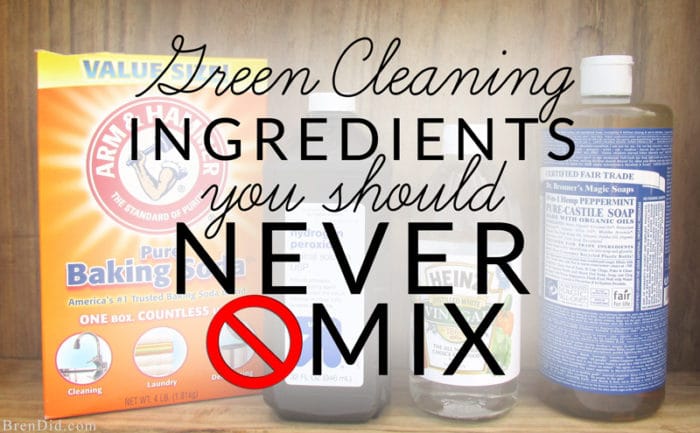
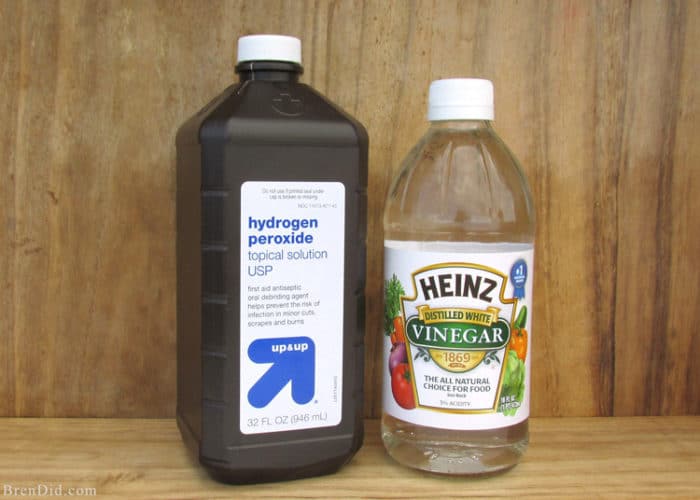
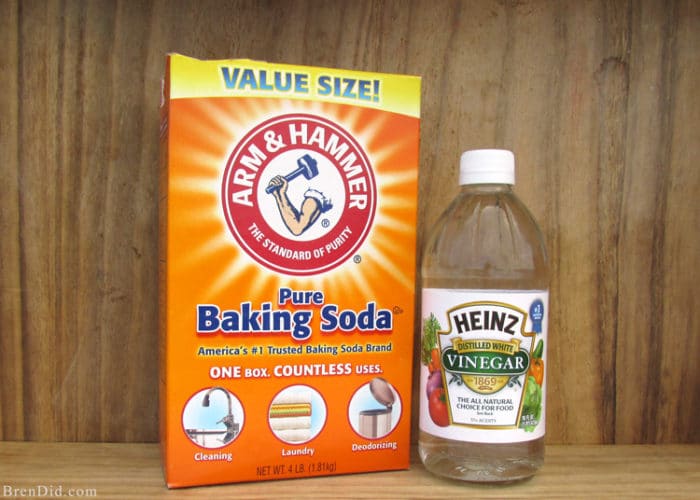
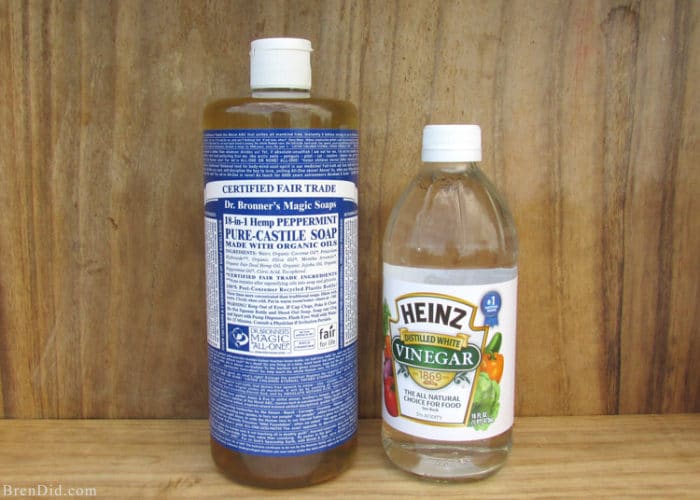
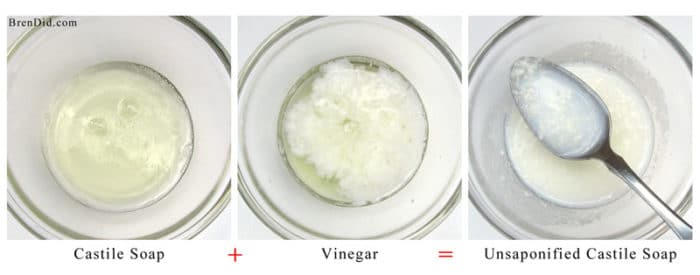
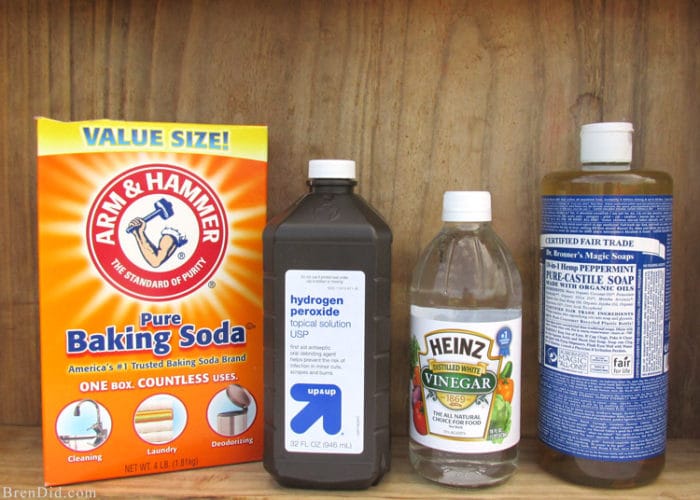
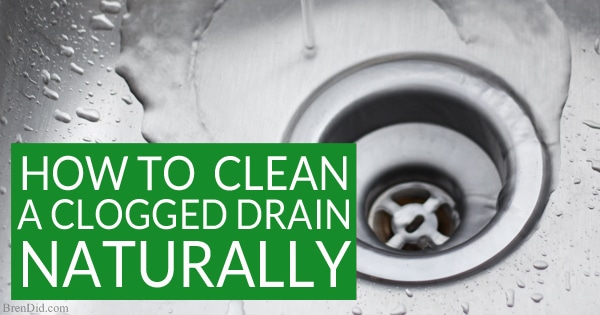
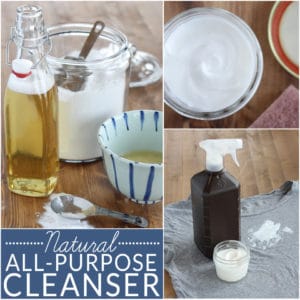

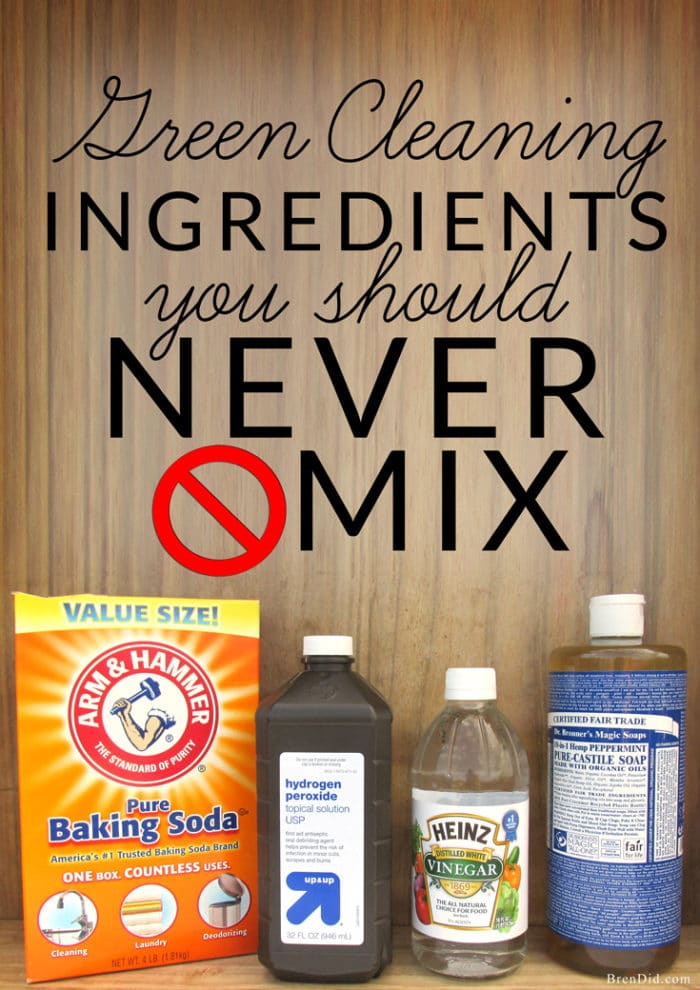
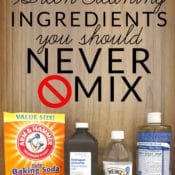
Lisa K.
Hello! This post is very helpful. I’m looking for tips to remove mold from tub caulk. Would you recommend a paste of baking soda and hydrogen peroxide? How long should it be left on? Or would using vinegar help instead? If so, just sprayed on? Thank you!
Bren
Vinegar and hydrogen peroxide are both effective at killing household mold. Vinegar is usually better for porous materials, so for caulk I would use a hydrogen peroxide and baking soda paste. You can also add a bit of dish detergent (this kind used for hand washing dishes) to help it cling. It’s the the mix I use for cleaning grout. Warning: It’s impossible to kill grout that is in caulk since it is growing through the material. You will be cleaning/removing the surface grout, but it will eventually comeback. It’s not generally dangerous, just annoying.
Mandy
I’m new to using a lot of these. Do you have a compiled list of common products that if mixed could cause toxic fumes? I never use bleach or ammonia. I do have borax, but now I’m hesitant to use it. My most commonly used products are baking soda, vinegar, oxi-clean, alcohol only on microfiber, I’m sure a few others.
Bren
Hi Mandy. This post is the only list I have so far. Borax is most dangerous if inhaled or with prolonged skin contact, otherwise you should be able to safely use it. I often just search “is it dangerous to mix…” and list the two things I’m considering mixing before making a new combo. Hope this helps!
Jennifer Williams
Thank you for your in-depth guide, I learned a lot, I will use this article as a reference for a long time. I was wondering if it’s okay to use baking soda and vinegar for clogged drains? I know it’s not great to breathe in, but the bubbling reaction I get seems to really do the trick, I run boiling hot water right after I pour the vinegar, I don’t want to put my family in danger by doing this though, is it safe to continue as long as I run water after the vinegar?
Bren
I do not use vinegar and baking soda together because they cancel each other out. I use dish detergent and hot water. You can read my drain cleaner experiment here. Hope this helps!
Donna Brooks
It’s not TOXIC. It just wastes the ingredients. Vinegar is acidic and it’s my understanding that baking soda is alkaline, which means they cancel each other out, making them both ineffective. The boiling water probably does more to clear the clog than the mix of baking soda & vinegar. That bubbling reaction doesn’t mean that it’s dissolving the clog. But boiling water can dissolve grease & loosen the gunk that is holding the clog to the pipe.
Meg
I have a fantastic stain remover- 1 part hydrogen peroxide, 1 part Dawn dish soap, 1 part baking soda. I’d like to make ahead and store this – can I mix and store safely? Do you think light will still have an effect when storing – should I store in peroxide bottles?
Bren
You can safety mix the three, but the combo works best when “fresh”– the baking soda accelerates the oxidation of the hydrogen peroxide which is what makes it a great stain remover — to make a mix you can store combine the dish detergent and baking soda then spritz with hydrogen peroxide when using. I explain the process here in my Natural All Purpose Cleanser post.
C.
Thanks for this excellent article!
Do you know if peroxide, baking soda, and citric acid can mix? I want to try making a toilet bomb with peroxide in it, and wasn’t sure if this was safe.
Bren
You can safely mix the three but liquid peroxide rapidly degrades once it is out of its container. Plus, baking soda and citric acid make a foaming acid/base reaction that cancels the other out. I would try citric acid and handwashing dish soap or baking soda and handwashing dis soap. Use a follow-up spray of hydrogen peroxide if you want to fight germs (for example: after a household member is sick, etc)
Danni
Hi Bren do you happen to have a recipe for an effective toilet bomb cleaner?
Bren
I do not have one but I need to start developing one!
Moe
Chlorine + Vinegar = Toxic Chlorine Gas, the same ones used in WW1.
Very toxic, throat lung, face, skin irritant.
Learnt that by making it and spraying it. 2 sprays on the surface and it had me coughing!
Richard
Or bleach and vinegar ( because bleach contains chlorine)
Cheryel Lemley-McRoy
I know you can use salt and lemon to clean copper. Can I use salt and white vinegar on stainless steel?
Bren
Tefal, the pot and pan manufacturer, says lemon and salt can be used on stainless steel. They recommend: halve a lemon, dip it in salt, and rub it against the stains until fully removed then wash your pan as usual.
Harrison
I just wanted to point out that paracetic acid is actually commonly used as a sanitizing agent (not a surfactant though). Granted, this is typically in an industrial setting with meticulously controlled concentrations and verification checks. My former workplace used sodium hypochlorite 12.5% at 200PPM ±15PPM and pH 6.0 – 7.5 for produce wash, and quaternary ammonium acid-based solution for general sanitation, but unfortunately it seems difficult to source either for residential use.
Anastasiah
Hi Bren 🙂
How are you?
Thanks for the important and safe info about mixing different cleaning ingredients.
What about Castile soap and baking soda?
Do you know why dish soap can be mixed with vinegar?
Thank you for your time and help 🤗
Have a wonderful weekend.
Bren
Castile soap and baking soda can be mixed. They make a lovely cleaning scrub. Dish soap is a synthetic detergent so it can be mixed with vinegar and will not break down. Castile is a natural soap which is why it breaks down when acid is added.
stephanie gagliano
I use a DIY bleach that has 3% hydrogen peroxide in it. I then would add that to my washing machine for white loads. I have DIY fabric softener that has vinegar in it can I add that ?
Bren
Yes, the hydrogen peroxide should be mostly been rinsed out by the machine before the fabric softener enters the machine.
Hope
Can you combine hydrogen peroxide with rubbing alcohol?
Bren
Mixing a 3% hydrogen peroxide solution and isopropyl alcohol is safe. They won’t react dangerously together. However, they should be mixed fr one use only (storing them in a container could cause off gasing that would make the storage container leak or explode.) Please note, mixing the two won’t make for a more effective disinfectant. I would simply use on or the other.
Harriet Lewis
Hi Bren, in reading your post, you described to refrain from mixing Castile Soap & Vinegar. (Liked your pictures describing why!) I’ve recently seen several recipes that combine Dawn Original Dish Detergent (or other detergents) & Vinegar. Are these two combinations different from each other or the same? I know the Castile Soap is plant based. But, I’m in the dark about Dawn Dish Detergent, other than it’s a degreaser. I tried to research it a little, but did not get very far, yet. I also did read that Castile Soap should not be used in the washing machine as it will gunk up the plumbing. I believe I read that on Dr Bonner’s website. I believe it was written by Lisa Bonner. I was surprised when I read that.
Boy, you really have to delve into background information to know what your doing! And, I wasn’t all that good in Chemistry class!
Bren
Castile soap is a soap while Dawn is a detergent so it is safe to mix with vinegar. Hope this helps!
Jinn
Thank you! You are right I’ve seen hundreds of recipes where these products are mixed together and alot of them were very infective. I’ve was never a fan of vinegar and baking soda mixture even though people swear it will remove grease and burnt on food off surfaces. This recipe never worked for me. I can see why now. This post was very helpful
Melanie
Can you mix Castile soap and lemon or orange essential oils?
Bren
Yes, citrus essential oils do not contain citric acid so they are not acidic like lemon juice or vinegar.
Julie
Is it safe to mix baking soda & hydrogen peroxide?
Bren
Yes, you can mix hydrogen peroxide and baking soda.
Betty
How about bleach+vinegar or bleach+ hydrogen peroxide or all three together?
Bren
Mixing bleach and vinegar creates potentially lethal chlorine gas. Mixing bleach and hydrogen peroxide also creates chlorine gas and can even cause an explosion! I would avoid any of these combos.
Jessi
Thanks! I would like to add that there are tons of diy floor and countertop cleaners with vinegar. It shouldn’t be used on any kind of stone or wood because over time vinegar will eat through the glaze or stain and start to damage the material itself.
Bren
Yes! You are totally correct. I explain more here.
Joyce Rivera
Thanks for your valuable words and research. I’ve seen so many posts that say to use vinegar and baking soda for cleaning and I dont understand why they think it works so well.
Bren
Thanks Joyce!
Jennifer Graham-Rateliff
Thank you thank you thank you! You have bashed one of my all-time pet-peeves right on the head. I get so annoyed with all the bad chemistry out there. Simply ridiculous!. Thank you for taking this on and being a light in the darkness.
Bren
Thanks Jennifer!
Lorelai
I use a mixture of hydrogen peroxide, baking soda, and dish soap to clean up cat urine from upholstery and floors. It works like a champ. I used to mix it right in the HP bottle and did have terrible leakage problems. Now I put it in a bigger spray bottle and have had no leakage issues at all.
Bren
It is a great mix for cleaning pet accidents, however I prefer to mix as needed since the hydrogen peroxide begins to break down as soon as it is mixed.
Janis
Do you know if it’s safe to use Lysol concentrated disinfectant with white vinegar and isopropyl alcohol for cleaning?
Bren
I would check the manufacturer’s recommendations on the Lysol. I prefer not to mix commercial cleaners because not all the ingredients are listed on the label so you really have no idea what you are mixing.
Ardeth
I know that both baking soda and hydrogen peroxide are both whitening agents, so I have been mixing them together and brushing my teeth and tongue to whiten my teeth. Is this okay? Also I have had chronic problem with dry and sore tongue and have tried different methods, none have worked until I started using the hydrogen peroxide and baking soda! Haven’t had a sore tongue since!
Bren
I did some research in this post and it seems to be a common mix!
Stephanie
I can NOT stop reading your blog posts. I’ve always wanted to go completely green when it comes to my cleaning supplies, but I’ve always been hesitant. Not knowing things essentially like this post for example. I love how your present your facts and it’s science-y. Thank you so much, I’ll be making a list in my bullet journal. Hahaha
Bren
Thanks, Stephanie! I hope you find the info you need to go green!
Debbie
Hello! I just mixed up a concoction this AM… to clean my soiled carpet.. I needed something fAst before the stink set in… so I found this recipe on Pinterest…
https://frugalginger.com/2015/07/miracle-carpet-cleaner/
Here’s what I mixed in a plastic spray bottle.. 😲😕😕😕
DIY Carpet Cleaner Solution Recipe
1 Tablespoon of clear dish soap ( she used Seventh Generation, I used clear 7th gen hand soap, all I had)
1 Tablespoon white vinegar
2 Tablespoons of Hydrogen Peroxide
2 cups of warm water
Combine all of the ingredients into a spray bottle and mix it around. Use right away, I don’t know how effective this will be if it sits around for a few days.
She vacuumed her carpets first then sprayed the cleaner on all of the stains and dark spots. She let it sit for a few minutes and scrubbed with a white cloth. I added the warm water after the white vinegar, then the hydogen peroxide last. 😲😲😲 Should I be concerned with this mixture?? 😢😣😢 If so, how do I safely dispose of it? 😲😢😣
Bren
I would not be concerned about disposing of the mixture since it is diluted with the water. (Just don’t breath it or get it in your eyes!) For future carpet cleaning you could use the same mixture but pick one (either hydrogen peroxide OR vinegar).
Erin
You have a great collection of information about the safety of making natural cleaners on your site. I was wondering if you compiled all of this from online research or if there is a book or books you would recommend that teaches about this in depth?
Bren
Erin, I have yet to find a GREAT book. I generally research each cleaner I make online and then analyze the ingredients for effectiveness/interactions.
Erin
May be time to write your own book 🤗!
Bren
😉
Courtney
I understand that baking soda and vinegar is an ineffective cleanser but what about as a whitening agent? Is it effective to mix the two to whiten my clothes in the washer? I want to do away with bleaching my whites with chlorine. I decided earlier to use a mixture of baking soda, hydrogen peroxide and vinegar as a single whitening punch instead since that are all natural whitening agents. But after reading your article I won’t. Thanks, I really appreciate the info.
Bren
Courtney, baking soda and vinegar still cancel each other out in the washer. I would use the baking soda and hydrogen peroxide to whiten and save the vinegar for the rinse. It’s great at helping to rinse out detergent and soften.
Ginger
Thanks for this! I’ve tried searching the internet many times about mixing certain natural ingredients and can never find anything. Fortunately I have not mixed any of these, wihoo!
Bren
I’m glad it was helpful, Ginger!
Stephanie
Is your vinegar+vodka effective on glass jars or is there another way to clean glass jars & reusing them? I’m not combing both but i’m still scared of using one after the other. I’m not sure if it’s safe to use ACV to disinfect the glass and rinse with water and then use baking soda to deodorize??. Or just use either by itself. I’ve also heard of mixing baking soda, dish soap and lemon to deodorize, but deodorizing doesn’t mean it’s disinfecting the jar, right? haha
Bren
Stephanie, I would run them through the dishwasher to dininfect or wash and then spray with hydrogen peroxide. Good luck!
Cindy
I forgot to change the spray bottle to read vinegar thinking I would do it later after cleaning Silk plants. Well much later I Needed to empty a bottle to use so combined the two w/matching bleach and water labels. I was quickly reminded of my forgetfulness when I stuck my nose too close. It waand pleasant. Are there any lasting effects if you only have one small whiff?
Bren
I would check with you doctor. Chlorine fumes are very dangerous and even more so when mixed with other substances.
Chris
Also important to never combine bleach and ammonia. Creates a toxic chemical that is bad for your lungs.
So important to remember chemistry when making natural cleaning solutions
Susan
Since you are talking about “natural” cleaners, you probably aren’t thinking about chlorine bleach or ammonia, but you should never mix those together, or with vinegar. Basically, (pardon the pun) don’t mix bleach with ANYTHING! Don’t add vinegar or baking soda or rubbing alcohol to other conventional cleaning products as they already have multiple chemicals in them which may interact. Windex may seem innocuous, but it does contain ammonia. A lot of “natural” cleansers like Dr. Bronners are base.
Bleach + Vinegar = Toxic Chlorine Gas. …
Ammonia + Bleach = Toxic Chloramine Vapors. …
Rubbing Alcohol + Bleach = Chloroform. …
Bren
Thanks for sharing, Susan. I don’t generally use bleach or ammonia anymore… too many fumes for me.
Mel
Hi Bren
Interesting read. I’ve been using vinegar (any) for cleaning/ laundry rinse / limescale removal & prevention and anti fungus treatment for years. I had used with bicarbonate of soda and thought it helped. What I have found it useful for though is to get rid of tea/ coffee stains in tea pots/ stainless steel sinks etc. Do you think that the bubbling reaction helps remove non greasy stains?
Bren
I prefer to use one or the other… either a vinegar soak or a baking soda sprinkle/soak. Vinegar (acidic) works best on basic soils like limescale while baking soda (basic) works great on acidic soils like coffee. Hope this helps! Bren
Roz
This is so useful when starting to make you’re own cleaning mixes, thank you!
I was going to make a shower cleaner that is vinegar, clove oil, tea tree oil, oregano oil and water.
I don’t have oregano oil so it was suggested lemon juice could work instead. But then I thought I could use citric acid as I have some of this and probably less likely for the mixture to go off with lemon juice.. Would this work?
Thanks
Bren
Roz, I generally try to start with the least amount of ingredients and work my way up if necessary. Why not try vinegar (which contains acetic acid), clove oil, tea tree oil, and water first? (Just omit the oregano oil.)
Ira J Collier
Can you commingle baking soda and hydrogen peroxide
Bren
Yes, you can mix them when cleaning but they cannot be stored… the mix will cause closed containers to explode. Read more in my all-purpose cleaner post.
Teresa
I’ve been seeing a lot of recipes for “toilet bombs” using citric acid and baking soda, and been wondering how effective they are if those two neutralize each other. But people swear by it 🤷♀️ ??
Bren
I’ve tried them and it worked fine. I think this is because:
1) the reaction occurs once the “bomb” hits the water (which is where you want the reaction to occur)
2) the reaction makes the soap bubble up the sides of the toilet which is convenient.
I’m too lazy to pre-make toilet bombs so I use a spray bottle of dish soap and vinegar, spritz the inside of the toilet, and then scrub with my toilet brush (it’s my no scrub shower cleaner recipe, I use it to clean sinks, showers, tubs and toilets so I only need one cleaner). It contains acid to fight hard water stains, vinegar to deodorize, and detergent to clean. Hope this helps!
Liz
Do you have a recommendation for an all-purpose cleaner that is a spray, not a paste. A paste just seems too difficult to me.
Bren
I like to use water with a tiny bit of dish soap and a microfiber cloth. Works great and it safe on most surfaces!
Sarah
Love love love. This info is gold! Thank you so much for sharing. I love hydrogen peroxide as a disinfectant. Vinegar is wonderful too but the smell can be a bit too strong for me. Just curious, I know Dr. Bronner’s castile soap comes a citrus scent. How do they keep the citrus oils from breaking down the castile soap? Are the oils chemically different from citrus juice?
Bren
Citrus essential oils are not acidic so you don’t have to worry about them interacting with Castile soap. Also the EOs in Dr Bronner’s soaps are added during the soap making process.
Elicea Webber
Hi! I came across this and am now wondering what in the world to even think. So many recipes that I have found and saved to try to make our home more “green” include vinegar and baking soda. One of the recipes includes vinegar, baking soda, and peroxide! My question is, does it make a difference if these are being mixed with other ingredients, not just each other? For example, one recipe also has citric acid and essential oil, along with the baking soda, vinegar, and peroxide. It calls for a tablespoon or less of each liquid ingredient, and a half cup or more of each powder ingredient. It is possible that because the liquids are such small amounts, that the powders might help dilute them a bit so that they are still all effective when used together in one solution?
Do I even make sense? Specifically, I am referring to this recipe: https://oneessentialcommunity.com/toilet-cleaning-fizzies/
Bren
Hi, Elicea! Homemade cleaners can be perplexing! I have done a lot of research (and made a lot of mistakes) since I started green cleaning and do not mix reactive ingredients in any ratio in my cleaners. The chemistry just doesn’t support it… even when there is water involved.
I use baking soda and peroxide together to clean grout, laundry stains, and more… no vinegar needed. I like to use vinegar and dish detergent as a no scrub shower cleaner that also works great on toilets… plus I don’t have to mold bath bombs!
I did make one toilet bomb recipe that used dish detergent, citric acid, and baking soda as a test. In that case the citric acid and baking soda neutralized each other but the reaction made the dish detergent foam up on the toilet bowl. It was great fun to watch and the dish detergent cleaned the toilet (when the foam was scrubbed with the toilet brush), BUT I found that a squirt of dish detergent and the toilet brush cleaned the toilet just as well and I didn’t have to take the time make bombs or buy citric acid and baking soda.
Basically, I try to stick to the simplest green cleaner possible. They work great and don’t waste my time or ingredients. (You can read more about pH and cleaning in my vinegar or baking soda posts.)
Hope this helps!
-Bren
Amanda
Is it ok to mix baking soda with lemon juice? Or does it have the same neutralizing effect as baking soda with vinegar?
Bren
Lemon juice + baking soda has the same neutralizing effect as vinegar + baking soda. It’s an acid + base reaction.
Lindsey
Great information! I have several homemade cleaner recipes that use Castile soap and vinegar, haven’t created “gunk” yet , but perhaps because proportions are so low. Good information to have on hand!
Bren
You’re correct, if the proportions are low you will not see the “gunk” up close but the desapofication is happening. If the cleaner is cloudy or white that is a sign of the “gunk”.
Traci
Great information! I didn’t have time to read all of the comments BUT, one thing I know from experience – baking soda and white vinegar soak gets body odor out of underarms when nothing else will. Not sure how it works but in this case, the combination definitely works and I have tried everything.
Bren
I love using hydrogen peroxide, detergent and baking soda for underarm stains and odor. Give it a try, it works great!
Courtney
I absolutely love this article! I had no idea you couldn’t mix vinegar and hydrogen peroxide! Great information!
Bren
Thanks, Courtney!
Stephanie, One Caring Mom
Wow! This is such good information to have. Thank you for sharing.
Bren
Thanks, Stephanie.
Angela McCoy
Thank you so much Bren. Great job. I am turning this into a chart for a quick reference guide.
Bren
😉
Patty
Hi Bren! I’ve seen quite a few cleaning recipes that contain rubbing alcohol. What natural ingredients if any should I avoid mixing with alcohol?
Bren
Patty, I prefer to use vodka instead of rubbing alcohol because rubbing alcohol contains artificial ingredients.Rubbing alcohol is ethanol, water, acetone, methyl isobutyl ketone, flavoring to make it taste bad and/or artificial coloring and artificial fragrance.) Vodka is ethanol and water. In addition, rubbing alcohol smells bad when sprayed and the vodka is almost odorless. The pH of ethanol is around 7 meaning it is pretty neutral (not acid or basic) so it should not neutralize other ingredients or break down soap or detergent. Vodka does not react with household vinegar or baking soda at room temperature. I would not mix alcohol (either rubbing alcohol or vodka) and hydrogen peroxide it can create an acid that has a bleaching and/or skin burning effect when used with bare hands. Hope this helps!
Laura
So will acidic essential oils have the same unsuponifying effect when combined with castile soap? Such as lemon or sweet orange? Thanks!
Bren
Good question, Laura. Lemon essential oil does not contain citric acid so it will not unsaponify the Castile soap.
Beth
LOL – I just made a shower spray I found on Pinterest – Castille soap, Hydrogen Peroxide and Vinegar! Doh! It got cloudy… I didn’t notice any curdles, yet, though. It didn’t provide the “slip” I wanted when squeegee-ing…. Do you have a recipe for a daily spray to keep the hard water stains and soap scum off the glass and tile until a regular cleaning? I have used Method shower spray and it lasts forever and works great, but I was looking for something I could make at home – the Method is hard to find in the stores, and most cleaners are mostly water, anyway! THANKS! Great site.
Bren
Hi Beth! I don’t have a daily shower spray… yet. I tend to dilute my no scrub shower cleaner and use that when I remember to spray down the shower. I’ll keep thinking about a daily version.
Kristie
Thank you so much for this post! I have thought about it many times when I was cleaning or doing laundry. I use vinegar quite a bit, and I use peroxide too. Once I read this post, I was more careful not to mix the two!
Bren
Thanks Kristie!
Tabitha Parenti
What is everyone’s problem with borax? Its not toxic like pharmaceutical companies have paid governments to tell us. It’s an extremely wonderful cleaner, fungicide, and applied lightly to the garden, a great fertilizer. At 30mg qid po for 3 weeks, it alleviates some types of arthritis pain. I have a link pinned with more information.
Bren
Tabitha, Borax use is somewhat controversial in green circles; it is a naturally occurring mineral, but it can also be dangerous. You can read more about the controversy at MNN. I prefer not to use it in my powdered detergent as it can be dangerous when inhaled but I do use it to kill ants when needed. I think everyone should decide what they feel safe using in their own home. Thanks for stopping by the blog!
Amelia
I keep coming across the posts about dish detergent and peroxide, saying it’s a miracle soap scup remover but it didn’t work for me, I don’t know why. What is the best thing to mix with peroxide for cleaning and what about all those that say to use it on cuts on skin or on pets. I know your not a doc. but maybe you have insights on why it shouldn’t be used in skin.
P. S. great site thanks for all the great info!
Bren
Thanks, Amelia. I love to mix hydrogen peroxide with baking soda and dish detergent as an all purpose household scrub (read more here ). I also use it to clean grout. Hydrogen peroxide is an oxidizing agent which is why it cleans well (it kills bacteria and can break up stains) however this same oxidizing can damage skin making cuts take longer to heal. You can read more here.
Sandra
What about adding vinegar to part rubbing alcohol and part water?
Bren
I’m not sure, Sandra. Rubbing alcohol contains isopropyl alcohol plus water, denaturants, and artificial fragrance so you have to figure out the reaction for each of these ingredients. I generally use vodka in place of rubbing alcohol which is only ethanol and water. Pure ethanol and acetic acid (vinegar) would make ethyl acetate.
Siswati P
Hi Bren, does this no mixture rule also apply to recipes for diy shampoo?
Bren
Yes the rule applies, I would not mix these ingredients in a shampoo. However, if you are using a vinegar rinse that is different than mixing them in the same container.
Michael
Thank you!! I enjoy all these cleaning tips that are all over Internet, but everytime I came across “mix baking soda and vinegar” I felt like the entire post was discredited just by stating that ignorant “tip”. People need to be better informed through posts like yours because sometimes it’s not just salt water they are making… Chemistry is dangerous!
Bren
Thanks, Michael!
Starr
I had been using a Castile soap detergent (my washing machine just doesn’t work well with powdered versions) and vinegar as a softener in the wash… So is that bad?
Bren
As long as the detergent and vinegar don’t mix until the rinse cycle you are good. The vinegar helps to break down the detergent so it rises more cleanly.
Elayna Locke
I am doing a BIG list on what not to mix and this had really helped me. Thank you!
Bren
I’m glad I could help, Elayna!
Sonia
I love your site! Thanks for posting this information. I, like you, have been using the baking soda/vinegar combination for years, and I also recently read that they are basically ineffective when used together. One of the best ways I had found to use them together is as an oven cleaner. Basically, you sprinkle baking soda all over the bottom of the oven wherever there is burnt-on grease. Then you spray the baking soda liberally (saturate it) with white vinegar. Wait one hour and then just wipe the burnt-on grease away with paper towels followed by a rinse with wet paper towels. It comes right off. Since together the baking soda/vinegar combo are ineffective, I wonder which one (the vinegar or the baking soda) is the cleaner that really makes cleaning the oven work? I’m guessing the vinegar?
Bren
Sonia, I did an experiment and the baking soda (alone) won! Check it out here.- Bren
Wendy
I am changing up the way I clean! I used to always use baking soda and vinegar! One tip you gals may not know is never mix dish detergent and bleach! It’s extremely toxic to the lungs! I learned that on the job as a candy maker. Thanks for your site! God bless you!
Bren
Thanks for the tip and the lovely comment, Wendy!
Miranda
So glad I found this. I haven’t attempted any recipes that combine any of these things yet thankfully. Thrilled to have avoided learning the hard way 🙂
Bren
Thanks Miranda!
Cris
Can you mix castille soap with baking soda?
Bren
Yes, you should have no problem. I mix it in my Natural All Purpose Cleanser.
Cris
Thanks!
blessedwith3girls
Do you have a recipe for carpet Steam cleaners? The one that has been repined to most lists baking soda and vinegar. I need help.
Bren
To clean carpets I vacuum with my Carpet and Room Deodorizing Powder then use 1 or 2 tsp of liquid castile soap in the washing compartment (fill the rest with water) of my capet cleaner and rinse with water plus 1/4-1/2 cup vinegar (I combine this in the rinse compartment). This combination is green and cleans great!
squirrelsforall
The best green carpet cleaner is warm water and powdered OxiClean. Vinegar will break down the rubber seals of a carpet cleaner over time, and castile soap will leave a residue on the carpet. Oxiclean is a stabilized peroxide salt, or in other words, a combination of washing soda (sodium carbonate) and peroxide (H2O2). Because it is basic, it acts as a detergent. Happy carpet cleaning! – chemist
Terri
Yes, thank you! The recipe I found had vinegar, castile soap, baking soda, peroxide and water. The author then revised the recipe to exclude the vinegar because of the reaction with the soap. I was still wondering if the soap would react to the peroxide. I guess I should’ve been more worried about the baking soda…yikes! Thanks for the warning! 🙂
Terri
Thank you for this. Looking through a lot of recipes, I see ingredients that don’t seem like a good idea to mix. For example, baking soda and vinegar is what you use to make a science fair volacano! I saw a cleaning spray recipe that used hydrogen peroxide and castile soap. Do you know if this is a bad combination too? Thanks!
Bren
Thanks Terri! I agree with you, there are quite a few cleaning recipes out there that mix ingredients that are not too effective! Hydrogen peroxide and castile soap are okay to mix, but I don’t usually mix them and store them. What are you cleaning? My Natural All Purpose Cleanser mixes castile soap and baking soda then gives it a boost (if desired) by spraying on hydrogen peroxide. I don’t mix them and store them because the hydrogen peroxide will react with baking soda neutralizing the cleaning power and releasing carbon dioxide. (This gas will make the bottle of cleaner explode, leak, or spray all over when opened.) Hope this helps!
Sara
Thank you, Bren! I will check out your recipe as well. And I misspoke DUH! =( Mine had washing soda and vinegar. Been awhile since I have made it and my mind is a mess. Is that combo a waste as well?
Bren
I’m sorry to tell you that sodium carbonate (washing soda) and vinegar also neutralize one another. They should not be combined in a cleaning solution. Sorry!
Sara
Hmm does that mean my homemade detergent isn’t any good? (Vinegar, Castille Soap, Baking Soda & optional lemon juice) =(
Bren
Sara, I’m sorry to say that you would be better off using the Castille soap and baking soda and then saving the vinegar and or lemon juice for the rinse. Have you seen my homemade laundry detergent recipe? It uses Castille soap and baking soda too!
Valerie Haag
What about dish soap and vinegar?
Bren
Valerie, liquid dish soap is a detergent which is made from synthetic products. This means it does not react or break down when combined with vinegar. I would check any dish soapd you use on the EWG’s guide. I prefer to use dish detergents which rate well.
elly
just because of this post I put your blog in my feedly list. I’m sick of soooo many recipes calling for vinegar+baking soda combo. At last someone who knows elementary basics of chemistry.
For sure, I’ll be experimenting with your recipes. Just keep up the good work :)))
N.B. Sorry for bad English. it’s not my mother language.
Bren
Thanks Elly, you are very kind. I am not sure I am great at chemistry, but I am great at research and investigations! I love a curious mind. I am glad to have you following along.
Sarah
What about vinegar and rubbing alcohol dawn soap ?
Bren
Sarah, it is okay to mix vinegar, rubbing alcohol, and Dawn soap. Dawn is a synthetic detergent so it does not react to vinegar the same way that Castile soap does. If you are looking for green cleaners you may want to avoid the rubbing alcohol and Dawn. I do not generally use rubbing alcohol in my home as it contains synthetic fragrance which can be made with cancer causing chemicals. You can read more about rubbing alcohol’s ratings here. I also do not use Dawn, you can read Dawn’s ratings here. I prefer to use a cleaner such as Sal’s Suds which rates well and does an excellent job cleaning the whole house.
Kay Bea
Vinegar and hydrogen peroxide are only effective as sanitizers when they are heated to 135 degrees and left to sir on the surface for a minimum of 10 minutes. Neither of them is effective against norovirus which is a highly contagious stomachs bug that is easily spread up to 25 feet from particles released into the air during vomiting or diarrea episodes. The only thing that sanitizes that pathogen is bleach.
Bren
Vinegar can sanitize, just not as completely as commercial cleansers. If you have an immune compromised family member it may be worth using bleach, otherwise scrubbing and a mild cleaner is generally sufficient for home care. You can read more here.
Felicia
What about rubbing alcohol and Castille soap? I’ve read that putting a little rubbing alcohol in the cleaner helps surfaces dry faster.
Bren
Interesting question, Felicia! It all has to do with the combination of acids and bases. pH measures how acidic or basic substances are on a scale from 0 to 14: a pH less than 7 is acidic and a pH greater than 7 is basic. Castille soap is a base with a pH around 8.9. Vinegar is an acid with a pH of about 2.4. Combining these two creates a reaction that cancels each other out and unsaponifies the soap. Rubbing alcohol has a pH of 5.5 so it is a weaker acid than vinegar, but it will react with the base (Castille soap) though maybe not to the same degree as vinegar. I don’t have any rubbing alcohol in the house of I would try out the reaction. You can test it by stirring together a teaspoon of Castille soap with some rubbing alcohol. I tried Castille and vodka (pH 6-7, nearly neutral) which doesn’t produce a visible reaction (as in the pictures above). I personally avoid using the rubbing alcohol (it can contain methyl isobutyl ketone, acetone, artificial fragrance, and artificial color).
Anna | iHOMESCOLORADO
Awesome! Great to know! Thanks for sharing
Bren
Thanks Anna!
Clare
Oh my gosh, I just cleaned pretty much my entire house (at least the walls) with a castile/vinegar/water mix. I’m laughing at myself so much! (The walls do look a lot better, though I think they might’ve done if I’d just used plain water, even.) Good lord. 🙂
Bren
Oh no! 🙂 It’s a simple mistake to make until you learn about the reaction. You are one motivated housekeeper! I am glad your walls look good!
Sam
What an incredibly useful article! Thanks for taking the time to write this! 🙂
Bren
Thanks Sam! I appreciate your compliment.
Elena Lescano
I had doubts, so I searched some more and found a very detailed explanation. It seems you are right about vinegar and baking soda. Thanks
Bren
I’m glad you found outside confirmation to satisfy your curiosity!
Elena Lescano
Everywhere you see people recomending a mixture of vinegar and baking soda for cleaning. Are they all wrong and you are right? How can I know?
ellie
Great post, thank you! I had read most of these, but one thing I’ve been unclear on – for the not mixing peroxide and vinegar, does that also apply to peroxide and lemon juice?
Bren
Good question, Ellie! Since lemon juice and vinegar are not the same chemical composition they do not react with h2o2 (hydrogen peroxide) the same way. You can mix lemon juice and hydrogen peroxide.
Jenny Himes
Wow thank you for this info! I have mixing baking soda and vinegar forever!
Bren
Thanks Jenny! I did it for a LONG time too!
Christy
I make VAP… 1/2 vinegar, 1/2 alcohol, 1/8 hydrogen peroxide. We made it up a few years ago after discussing it and synthetic cleaners with our veterinarian after adopting a sick kitten. We have used it daily for the past 3 years to clean everything from countertops, floors, desks, painted wood surfaces, plastics, etc. I waited and still wait to see if it is going to damage or fad any of our surfaces and it hasn’t. Having a science degree and a background in chemistry, I knew that mixing peroxide and vinegar is a “no no”. However, it’s all about the amounts you are mixing. ?
Bren
I’m glad to hear you have had no damage from the cleaner. I assume you are using it for a disinfecting spray? Science News suggests that using them as a 1-2 punch, first one spray and then the other is more effective.
Robin Taney
Wow!! I had no idea that baking soda and vinegar was ineffective. Thank you so much for this great post!
Bren
Thanks Robin!
purplepiggie
Thank you for this post! The baking soda and vinegar combo drives me absolutely nuts. It’s everywhere and constantly recommended as a fabulous cleaner and I keep saying to myself, “But you’re just cleaning with water!” whenever I see another post recommending it. It’s my pet peeve so I’m so glad you took the time to post about how useless it is!
Bren
Thank you for commenting! People do love their vinegar and baking soda. I admit I used to use it too, now that I’ve educated myself on the science I stick to using the reaction to thrill my kids… Like mentos and soda!
Yogitha
Thanks for this post Bren. I have two questions:
1) Is a combination of Vinegar and water okay for a mulit purpose spray?
2) My husband applies baking soda to clean his scalp. Then rises it with white vinegar – the no poo method. He started on this a few years ago to address dandruff and hair fall and it seems to have worked? based on your post, should he be using just or the other to save $$
Bren
Yogitha, yes you can use water and vinegar in a multi purpose spray just be careful using it on wood or natural stone. The acid in the vinegar can harm natural materials. If there’s a doubt I use vodka cleaner.
2) It sounds like your husband is using vinegar as a rinse aid which is the correct way to use it with baking soda. The problem happens when you mix the two together and neutralize them before you start cleaning.
Hope this answers your questions! -Bren
Lee Hernandez
I was making the mistake with castille soap and vinegar. I have also mixed Dawn and vinegar as an all-purpose cleaner. I thought that mix was working well. Is it also a bad combination like with the castille soap?
Bren
Lee, Dawn is a synthetic detergent so it should hold up to the vinegar. That being said, it doesn’t rate especially well on the EWG scale if you are looking for a natural cleaner. Hope this helps!
co
Thanks for posting this. It will help as I begin my natural cleaning processes.
Bren
Thanks Connie! Let me know if you have questions!
Nancy Kvapil
I was using baking soda, lemon to scrub my kitchen counters. Then I would spray it down with vinegar. Obviously not getting much cleaning done. =( Thanks for the info!
Bren
I bet the lemon and baking soda were doing a great job, but I agree the vinegar was probably overkill! Next time you can use the baking soda and lemon and just rinse with water… instant savings!
Hollie Black-Ramsey
Ooh! Good to know. Pinning to share!
Bren
Thanks for sharing Hollie!
Sarah @The Teacher's Wife
Thanks for such an informative post. I make a few of my own cleaners and hope to make more as I run out of the store bought cleaners I have left, but I want to make sure I do it safely! 🙂
Bren
Thanks Sarah! I love making my own cleaners and I agree, I want them to be safe.
Stacey @ Stacey Homemaker
This list is exactly what I’ve been looking for! I just started making my own cleaners and I was worried I might accidentally mix something that shouldn’t be mixed! Do you have any recipes for kitchen counter cleaner? I put vinegar and water in a spray bottle but my fiance doesn’t like the smell.
Bren
I’m happy the list is helpful to you, Stacey! Have you seen my Room Refresher Spray? It makes great counter cleaner too just add a bit less of the essential oils. You can also just use vodka and water in a spray bottle or a little Castile soap and water. Hope this helps!
Julie @ Loggers Wife
I’ve never mixed hydrogen peroxide and vinegar anyway but good to know that it’s a very bad idea. I didn’t know that about the castile soap either. (visiting from Frugal Fridays)
Bren
Glad you stopped by, Julie!
Aliza @ Home Crafts by Ali
Thanks for sharing this information! We are trying to be greener in our life and knowing what items shouldn’t be mixed is good. Thanks for linking up at the Bloggers Brags party, I pinned your post to our group board.
Bren
Thanks Aliza! Good luck with your green journey!
Sarah Titus
Ohh, that is good to know. Thank you for sharing! 🙂
Bren
Thanks Sarah! Always good to learn more about cleaning! 🙂
Jenn Alex
I love this info. I started making my own laundry soap last year and haven’t looked back yet. But, I did not know about mixing some of these ingredients together.
Bren
Thanks Jenn! I am so excited to hear that you are a cleaning DIYer too. I love making my own laundry detergent too.